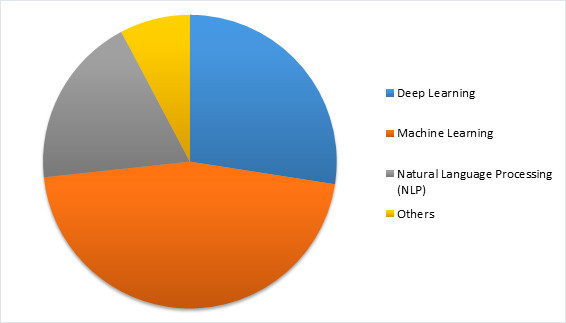views

Artificial Intelligence In Retail Market
Artificial Intelligence in Retail Market Overview
Global Retail Artificial Intelligence Market generated a value of $1,524.3 million in 2020 and is estimated to reach $10,164.7 million by 2026, growing at a CAGR of 40.10% during the forecast period of 2021-2026. Artificial Intelligence in retail enables faster business decisions based on outputs from cognitive technologies and saves time and money by automating and optimizing routine processes and tasks. Business leaders are looking for ways to sharpen their competitive edge, and are implementing AI to improve the standards, customer experience, and revenues and fast processing. Retail Artificial Intelligence (AI) is set to pave the way for the smart commercialism in industries like food & beverages, electronics, fashion and all other sectors, where processes can be optimized by machine learning and predicting the human behavior. Ai in Retail Market is majorly driven by increased usage of artificial intelligence in customer relationship management, warehouse automation and in online stores, especially in clothing. The expanding investments in AI-based solutions along with the rising machine ability for verdict creation from trillion bytes of online data is estimated to drive the market growth during the forecast period 2021-2026.
Artificial Intelligence in Retail Market Report Coverage
The report: “Ai in Retail Market Report– Forecast (2021-2026)”, by IndustryARC covers an in-depth analysis of the following segments of the Ai in Retail market
By Platform: E-Commerce, In Store
By Technology: Deep Learning, Machine Learning, NLP and Others
By Implementation: Cloud, On Premises
By End User: Retail, Electronics, Logistics, Food and Beverages and Others
By Application: Customer Relationship Management, Supply Chain Analysis, Fake Review Analysis, Merchandising (Facets and Filter selection, Multi-Device Interaction, Others), Warehouse Automation (Sorting and Placing, Inventory Storage, Others), Product Recommendation, Customer Service (Chat-bots, Sentiment Analysis), Fleet Management and Others
By Geography: North America (U.S, Canada, Mexico), South America(Brazil, Argentina and others), Europe(Germany, UK, France, Italy, Spain, Russia and Others), APAC(China, Japan India, SK, Aus and Others), and RoW (Middle East and Africa)
Key Takeaways
- By Implementation, Cloud hosting segment is the major segment generating revenue of $916.26m in 2020 and is forecast to generate $6,993m by 2026. This is mainly owing to its agility which helps in upscale and downscale depending upon
- By Technology, Machine Learning segment held the major share by generating a revenue of 698.83m in 2020 and is estimated to grow at a CAGR of 40.90% during the forecast period 2021-2026.
- Natural Language Processing (NLP) segment is estimated to grow at a fastest CAGR of 42.75% during the forecast period 2021-2026. NLP is gaining popularity owing to its ability of helping machines read, understand and derive meaning from human language.
Global Ai in Retail Market, By Technology, 2020

For More Details on This Report - Request for Sample
Artificial Intelligence in Retail Market Segment Analysis - By Platform
<span lang="EN-GB" times="" new="" roman";mso-bidi-font-family:calibri;="" mso-bidi-theme-font:minor-latin;color:black;mso-themecolor:text1;mso-ansi-language:="" en-gb"="" style="box-sizing: border-box;">By Platform, In Store segment held the major share in 2020 with a revenue of 943.78m and is estimated to reach 5,407.55m by 2026 growing at a CAGR of 36.60% during the forecast period 2021-2026. However, E-Commerce segment is estimated to grow at a fastest rate CAGR of 44.84% during the forecast period 2021-2026. <span lang="EN-GB" times="" new="" roman";mso-bidi-font-family:calibri;mso-bidi-theme-font:minor-latin;="" color:black;mso-themecolor:text1;mso-ansi-language:en-gb"="" style="box-sizing: border-box;">Commerce Artificial Intelligence, which has started is showing effect on different industries such as marketing, finance, healthcare, and more, used in the area of e-commerce. It is predicted to see a huge surge of Retail artificial Intelligence in e-commerce, and this technology is used to develop valuable business insights. Today, AI in Retail is modifying the way in which e-commerce stores function and offer the services to their customers. Some of the ways in which commerce artificial intelligence is changing the field of online shopping are image search, customer centric search, retarget potential customers, virtual buying assistants, analyzing big data. The technology also offers innovative opportunities to evaluate Big Data and lets e-commerce business connect with their customers on a new level and create superior client experiences. AI applications analyses the customer data to project future shopping trends and make product recommendations based on browsing pattern which is driving the markets growth. However, this comes at high cost, it is a complex process, apart from the installation costs, the restoration and maintenance is often pricey. Also, if there is a breakdown, the costs and time of procurement is very high which is likely to hinder the market.
Artificial Intelligence in Retail Market<span times="" new="" roman";mso-bidi-font-family:calibri;mso-bidi-theme-font:minor-latin;="" color:black;mso-themecolor:text1;background:white"="" style="box-sizing: border-box;"> Segment Analysis - By Application
By Application, Warehouse segment is the major revenue generating segment with $403.53m in 2020 and is forecast to generate $2,969.39m by 2026. This is mainly owing to the use of robots to automate and speed up work. The Retail Artificial Intelligence is all around us, all the business have been using AI technology to improve the decision-making process, and the use of Customer Relationship Management (CRM) is growing as well. Integration of AI into CRM can automate the customer emails, reports, captures the data and more, which avoids the risk of human errors in daily life and in administration. According to the trends of 2020, CRM has evolved, and the AI technology has improved the customer experience as it predicts the future behavior of the customer and segmentation of customers becomes easy, image recognition and sentiment analysis are factors which supports that CRM is the future of the market and which is likely to drive the market. For all these programs to work effectively, a vast volume of information must be gathered and processed. This ensures that the companies are largely responsible for the data protection, in the areas like privacy of customers and privacy of the entire business and there can be risk of data exploitation or system gets corrupted leading to security threats which is likely to hinder the market growth.
Artificial Intelligence in Retail Market<span times="" new="" roman";mso-bidi-font-family:calibri;mso-bidi-theme-font:minor-latin;="" color:black;mso-themecolor:text1;background:white"="" style="box-sizing: border-box;"> Segment Analysis - By Geography
North America is the major region dominating the Retail Artificial Intelligence Market with revenue of $561.27m in 2020 and is also estimated to grow at a fastest CAGR of 39.55% during the forecast period of 2021-2026 to generate a revenue of $3,656.34m in 2026. North America is leading the market especially owing to the availability of leading players of the market in the region and high investments by the government and private entities to advance in the AI technology. In North America region, U.S. is dominating the Retail Artificial Intelligence Market generating a revenue of $397.74m in 2020 and is also estimated to grow at a CAGR of 40.03% during the forecast period of 2021-2026 to generate a revenue of $2,644.99m in 2026. Mexico is likely to surpass U.S in terms of CAGR with 42.56% for the forecast period 2021-2026. Europe is the second major region dominating the Retail Artificial Intelligence Market with revenue of $420.79m in 2020 and is also estimated to grow at a CAGR of 41.53% during the forecast period of 2021-2026 to generate a revenue of $2,984.57m in 2026. The market is fragmented with key players accounting for about 44.54% of the market revenue in 2020. Companies in this market are adopting acquisitions to cut-down competition.
Artificial Intelligence in Retail Market<span times="" new="" roman";mso-fareast-theme-font:minor-fareast;mso-bidi-font-family:="" calibri;mso-bidi-theme-font:minor-latin;color:black;mso-themecolor:text1;="" background:white"="" style="box-sizing: border-box;"> Drivers
<span times="" new="" roman";mso-bidi-font-family:calibri;="" mso-bidi-theme-font:minor-latin;color:black;mso-themecolor:text1;border:none="" windowtext="" 1.0pt;="" mso-border-alt:none="" 0in;padding:0in"="" style="box-sizing: border-box;">Increasing Use of AI in CRM
<span times="" new="" roman";mso-bidi-font-family:calibri;="" mso-bidi-theme-font:minor-latin;color:black;mso-themecolor:text1;border:none="" windowtext="" 1.0pt;="" mso-border-alt:none="" 0in;padding:0in;mso-bidi-font-weight:bold"="" style="box-sizing: border-box;">Customer Relationship Management (CRM) software has evolved with many developments such as face and voice recognition. For example, Salesforce Einstein and Zoho CRMs Zia are AI-powered CRM that uses voice commands to access information. Companies are using AI to boost their decision-making processes such as online customer support, intelligent personal assistants, and process automation. 65% of the company's business comes from existing customers and it costs five times greater to attract a new customer than to keep an existed satisfied one. Thus, the use of CRM is essential. Integration of AI tools in CRM will help them to better understand the customers by processing more information in terms of data. Sales representatives who spend their half of time in CRM for trying to manage CRM tasks more effectively. AI technology can easily surpass this challenge by automating most of these tasks and eventually offering more valuable insights. This is turn is driving the growth of the Ai in Retail market during the forecast period 2021-2026.
Increasing Deployment in Growing E-Commerce Sector
Artificial Intelligence is enabling consumers to sense, predict, and automate. It helps startups, manufacturers, and retailers to set a new example in the industry by improving user experience. In 2020, around 80% of consumer interaction in the e-commerce industry is handled by Artificial Intelligence (AI). Trends of consumers are changing in terms of using such technological products and purchasing power. Advanced Visual Search engines such as Google, Amazon, Bing uses real-world images such as snaps, screenshots, internet images for online searches. These features are leveraged by many famous retailers such as ASOS, eBay, Disney, Levis, etc. Moreover, Natural Language Processing (NLP) is used on a wider scale in e-commerce industry to analyze customers’ behavior, shopping trends, and customized recommendations for increasing upselling. With increasing recommendations, accurate e-commerce companies are set to build brand loyalty and expand their customer base. Deep Learning Algorithms are used to recommend e-commerce products as per various patterns in shopping behavior. By analyzing customer data from different channels, the algorithm can identify behavior and purchasing patterns which can be used to predict the exact need and want of customers. Thus, use of AI in e-commerce industry is driving the demand for Commerce Artificial Intelligence during the forecast period 2021-2026.
Artificial Intelligence in Retail Market<span times="" new="" roman";mso-bidi-font-family:calibri;mso-bidi-theme-font:minor-latin;="" color:black;mso-themecolor:text1;background:white"="" style="box-sizing: border-box;"> Challenges
<span times="" new="" roman";mso-fareast-theme-font:minor-fareast;="" mso-bidi-font-family:calibri;mso-bidi-theme-font:minor-latin;color:black;="" mso-themecolor:text1;background:white"="" style="box-sizing: border-box;">High Cost of AI Solutions
<span times="" new="" roman";mso-fareast-theme-font:minor-fareast;="" mso-bidi-font-family:calibri;mso-bidi-theme-font:minor-latin;color:black;="" mso-themecolor:text1;background:white;mso-bidi-font-weight:bold"="" style="box-sizing: border-box;">Custom AI solutions cost between $6000 to $300,000. This price includes developments and rollout. Ongoing Ai services like consulting charge less however its usage in different industries such as e-commerce, logistics, retail are higher. Businesses that are limited to in-house skills or unfamiliar with Artificial Intelligence often must outsource where main challenge of the cost comes around. The cost of Artificial Intelligence depends on the type of plan used in different applications. Small and medium-size organization struggles when it comes to adopting AI technologies because of their higher cost. Artificial Intelligence adopters tend to think about these technologies more expansively in order to grow and increase their market share, while companies with less experience focus mostly on reducing cost whereas high digitalized companies invest more in AI and derive greater value from its use. Thus, High cost is set to be a restraining factor for the growth of Retail Artificial Intelligence (AI) during the forecast period 2021-2026.
Artificial Intelligence in Retail Market Landscape
Product launches, acquisitions, Partnerships and R&D activities are key strategies adopted by players <span lang="EN-GB" calibri",sans-serif;="" mso-ascii-theme-font:minor-latin;mso-hansi-theme-font:minor-latin;mso-bidi-theme-font:="" minor-latin;color:black;mso-themecolor:text1"="" style="box-sizing: border-box;">in the Ai in Retail market. Ai in Retail top 10 companies include Amazon Web Service, Microsoft Corporation., Google Inc. (Alphabet Inc.), IBM Corporation, SAP., and others.
<span times="" new="" roman";mso-bidi-font-family:calibri;="" mso-bidi-theme-font:minor-latin;color:black;mso-themecolor:text1;mso-bidi-font-style:="" italic"="" style="box-sizing: border-box;">Acquisitions/Product Launches
In September 2020, Google LLC recently introduced a raft of new products and capabilities within its cloud portfolio, including several new products and features in Contact Center AI and new versions of Document AI.
In June 2020, Microsoft Corp. acquired Cyber X, Inc. a software company. This acquisition enable Microsoft to accelerate and secure customers’ IoT deployments.












